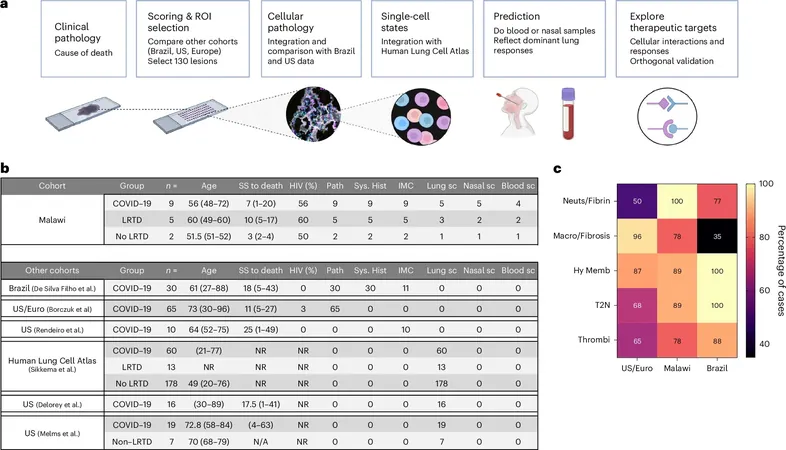
Landmark Study Reveals Unique Immune Responses to COVID-19 in Malawi: A Game Changer for Global Health Insights!
2024-11-20
Author: Arjun
Introduction
In a groundbreaking study published in *Nature Medicine*, researchers have unveiled critical differences in the immune responses of COVID-19 patients in Malawi, highlighting the urgent need for tailored treatments for diverse patient populations around the world.
Research Overview
This pioneering research, which is the first to examine single-cell lung differences in a Sub-Saharan African cohort, underscores the significant role of local environmental and genetic factors in the fight against infectious diseases.
Study Details
Conducted by a collaborative team led by the University of Glasgow, alongside Malawian scientists from the Malawi-Liverpool-Wellcome Program and Kamuzu University of Health Sciences, the study involved postmortem analysis of lung and nasal tissues, as well as blood samples from patients who succumbed to severe lung illnesses during the early pandemic years (2020-2021).
Utilizing advanced imaging mass cytometry, a state-of-the-art technology, the researchers aimed to provide deeper insight into how COVID-19 has uniquely impacted Malawian patients.
Key Findings
While the broad immunological and pathological changes observed in the Malawian group were largely consistent with those seen in non-African populations, the study revealed critical cellular-level differences that could influence the effectiveness of various treatments.
Notably, the findings suggest that common therapies like corticosteroids may still be beneficial, yet some widely used treatments may not yield the same results for Malawian patients.
Impact of Environmental Factors
The study illuminated the potential impact of lifelong exposure to endemic diseases such as tuberculosis and malaria, pushing researchers to consider how these environmental aspects could modify immune responses to SARS-CoV-2.
Significance of Research
This invaluable research emphasizes the necessity of focused investigations in different regions to cultivate a comprehensive understanding of health dynamics and disease management globally.
Collaborative Efforts
Dr. Christopher Moxon, the lead author from the University of Glasgow, celebrated the collaborative effort, stating, “This research is a shining example of how interdisciplinary and international cooperation can yield crucial insights, fostering innovation in regions that often bear the brunt of health disparities.”
Call to Action
Furthermore, James Nyirenda, the first author, emphasized the importance of investing in advanced scientific research in low-income areas.
He pointed out, "Our findings illustrate that understanding unique immune responses can unlock paths to more effective and accessible treatments for populations that too often remain in the shadows of healthcare innovation."
Conclusion
As the global scientific community turns its attention towards equitable healthcare solutions, this study serves as a call to action for researchers and policymakers alike: to prioritize investment in local scientific initiatives that can lead to tailored healthcare strategies worldwide.
The implications of this research could very well shape the future of treatment protocols for COVID-19 and beyond, marking a pivotal moment in global health understanding.




 Brasil (PT)
Brasil (PT)
 Canada (EN)
Canada (EN)
 Chile (ES)
Chile (ES)
 España (ES)
España (ES)
 France (FR)
France (FR)
 Hong Kong (EN)
Hong Kong (EN)
 Italia (IT)
Italia (IT)
 日本 (JA)
日本 (JA)
 Magyarország (HU)
Magyarország (HU)
 Norge (NO)
Norge (NO)
 Polska (PL)
Polska (PL)
 Schweiz (DE)
Schweiz (DE)
 Singapore (EN)
Singapore (EN)
 Sverige (SV)
Sverige (SV)
 Suomi (FI)
Suomi (FI)
 Türkiye (TR)
Türkiye (TR)